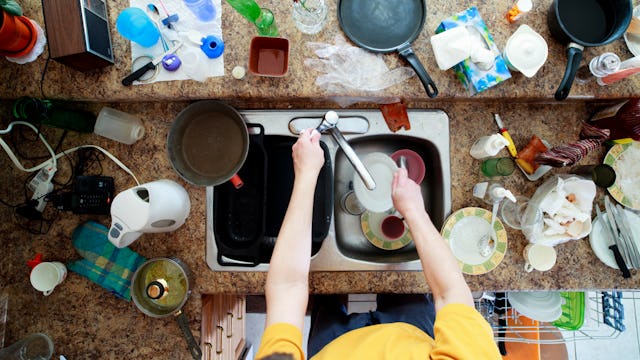I Need To Declutter, But The Thought Alone Is Triggering My Anxiety

Sometimes it feels as if I need to declutter my entire life. I will look around and immediately feel overwhelmed by the mess:
Why are there so many clothes on the floor? How can kids so small make a mess this big? Do we really need this many toys? Who keeps buying these microscopic lego sets, anyway?
It’s been proven that clutter can trigger anxiety. This probably isn’t surprising information for anyone who has anxiety, as we know that feeling overwhelmed is kind of our thing. We’re especially triggered by things we cannot control, or that seem insurmountable. Like mountains of toys that seem to breed over night.
It has become a vicious cycle for me: Anxiety allows the clutter to get out of control, then I get more anxiety and it becomes even harder to face the mess. Then I get ragey.
So what can you do when you have anxiety, but your house is pretty much always a disaster?
Try to keep your mind and body calm.
Yes, it sounds easier than it is, but taking deep breaths and using positive mantras can be helpful. Sometimes I will go to a yoga class before trying to clean, because it’s easier if I start from a place of calm than when I stress-clean. And I tend to yell at my family a lot less in the process too. Win-win.
Think positive thoughts.
I know, I know, it’s a little Peter Pan, even for me. But I know from experience that it makes a difference when you go through your house saying, “This place is going to look so much better!” Rather than, “What did I do in a past life to deserve living with these slobs?”
Make it as enjoyable as you can.
I like to blast music that I love. I’ve been known to pour myself a drink before I even attempt to declutter a closet. To each their own.
Find a balance.
Yes, stress-cleaning can get some great results, too. But it’s important to give yourself breaks. Get out of the house and clear your mind for a little while.
Get some support if needed.
A friend, a family member, or maybe a professional organizer. Find someone who will help motivate you and keep you company if that’s helpful.
Recruit help from your spouse.
If they don’t want to help clean (or your definitions of “clean” are very, very different), then maybe they can take the kids to the park for a few hours while you get things done around the house. Find a way for them to support you that works well for both of you. Because, hello, they live there too and should share in the responsibility.
Have a plan.
Set realistic expectations about how much you’ll be able to get done. Short-term goals can be a great motivator when the long-term goals seem too overwhelming. Clean house? Maybe someday soon. A clean countertop? Now that you can do.
Incorporate cleaning into your daily routine.
Sometimes the pile of dirty dishes in my sink gets so huge, it’s intimidating. But I’ve found if I make it a point to do them (or ask my husband to do them) before I go to bed, I feel less overwhelmed the next morning. Since that’s done, I can make my coffee with a clean sink and move onto other things that need to be done.
Take baby steps.
Maybe just start with cleaning in 30-minute intervals. Or pick one spot to make a peaceful retreat for yourself. If you’ve got small kids, start somewhere you can escape behind a locked door, like your room or your bathroom.Think of it as your mental health retreat space when you feel your anxiety creeping up on you.
Skip the hard parts if you need to.
If you’re like me, you might get anxiety and guilt about giving/throwing things away. Sometimes, if I’m unsure what I’m willing to purge, I’ll put things in a big box. If I don’t go back into that box for anything within a month, I give myself permission to give it away. #ProcrastinationForTheWin
Find a mix of steps that works best for you and do a little bit at a time. You deserve a clean house that won’t trigger your anxiety. And with a little help, you can break the cycle.
This article was originally published on